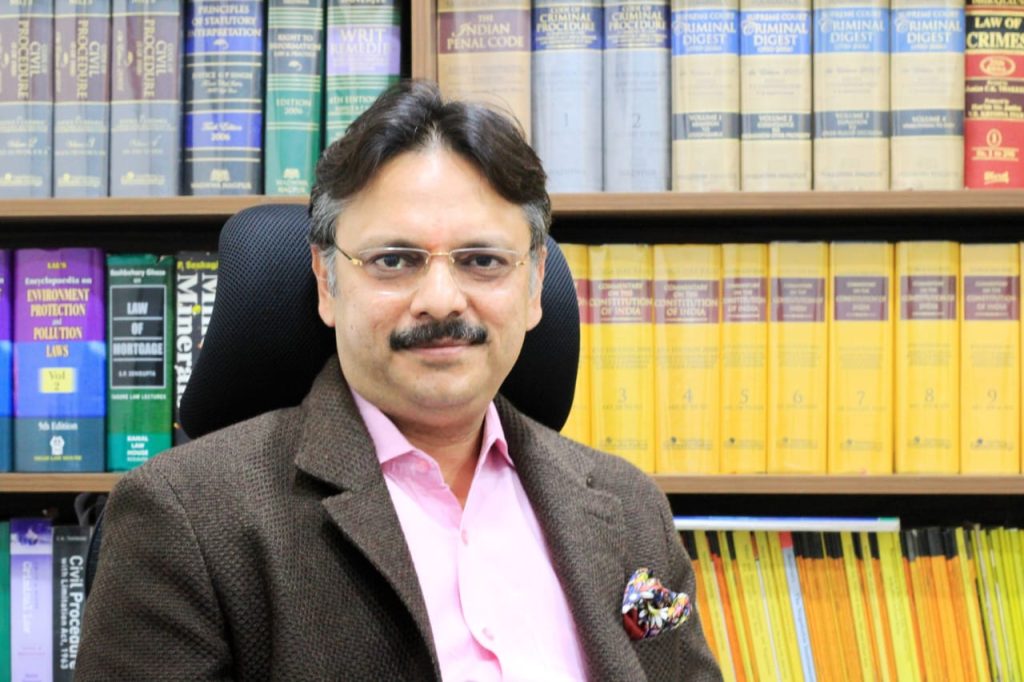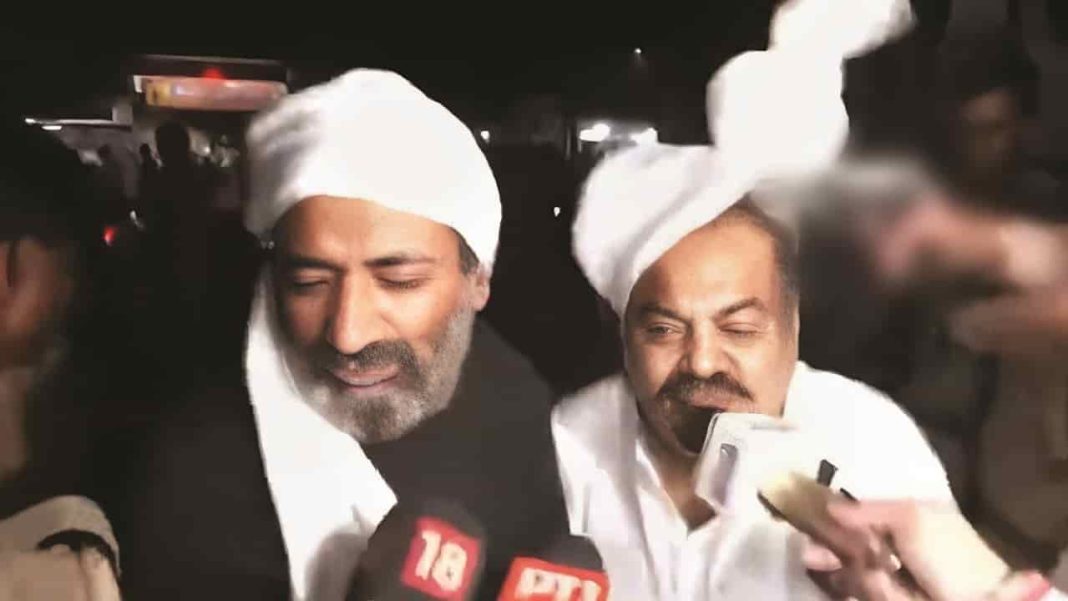By Rajeshwar Singh
Gangster Atiq Ahmed and his brother Ashraf were killed in front of TV cameras, while in police custody in Prayagraj on 15th of April. The killings have captured the national interest and brought to the forefront the issue of organised crime in the state of Uttar Pradesh and the country in general.

People on all sides of the political spectrum have opined on the issue. In fact, there have also been several opinion pieces in leading English newspapers country-wide which have criticised the state authorities and sympathised with Ahmed. However, these seem to be misdirected attacks which do not address the actual underlying issues.
Most discussions surrounding the incident have been limited to criticism of extra judicial killings, i.e. police encounters. This ignores the vital fact that Atiq Ahmed was not gunned down by the police. In fact, he was killed by three young men who, presumably, were also involved in organised crime in UP, much like Ahmed. Hence, it is vital that the murder of Ahmed should herald a discussion on what are the factors that allow such prevalence of organised crime in UP and what reforms should be contemplated to remedy the same.
Suggested reforms to tackle organised crime syndicates
It is relevant to highlight the endemic issues on account of which organised crime has grown to be a problem that regularly results in incidents that capture national and international attention. A slow and inefficient investigative and judicial machinery, rampant intimidation of witnesses, easy availability of illegal arms are some of the primary facilitators of organised crime.
Special investigative units and courts leading to faster convictions
The sluggish judicial mechanism in the country is consistently exploited by criminal syndicates to continue operations despite their nature being an ‘open secret’. On account of the slow judicial and investigative process in India, gangsters like Ahmed are under-trial for far too long and hence even the institution of cases does not mar their criminal operations. Due to this becoming a long-drawn process, the ability of the criminal justice system to hold them accountable reduces significantly.
Prolonged trials, being in their interest, there are many creative steps utilised by such criminals to delay trials. From making witnesses disappear or intimidating them into withdrawing, to sending threats to the prosecutors and judges has been the norm. Gangsters and wealthy criminals have also been able to access rights given to under trials and accused persons under the law to the fullest extent, including bail provisions and being given every freedom afforded to prisoners under the law. This has meant that these individuals have been able to continue running their criminal gangs from within prison and maintain their political hold in certain regions.
Accordingly, it is imperative that specialised courts conducting fast-track trials are established to deal with matters relating to gang-violence. In UP, the Uttar Pradesh Control of Goondas Act, 1970 (Goonda Act) deals with such mobsters and specifically defines a “goonda” providing for detention and externment of such persons. This particular actandU.P. Gangsters and Anti-Social Activities (Prevention)Act, 1986, whose validity and section has also been upheld recently by the honourableSupreme Court on 27th April 2022, should be expanded to establish special fast-track courts to try such persons and provide for harsher punishments against such habitual offenders for gang-related crimes. The trial must conclude in a maximum of 2 years.
Further, the governments should establish a specialised anti-gang unit within the police department, which should have the authority to investigate and prosecute gang-related crimes. This unit should be provided with adequate resources, training, and equipment to effectively combat gang violence.
Even the judiciary needs to ensure that cases related to gang violence are prioritized and dealt promptly. This would send a strong message that the justice system takes gang violence seriously and would act as a deterrent for potential offenders.
Witness protection
Additionally, organised crime syndicates often use violence and intimidation tactics to perpetuate their control over certain areas and communities. One way they do this is by intimidating witnesses who might speak out against their criminal activities. Witnesses who speak out against gang violence or cooperate with law enforcement agencies may be threatened or physically harmed, making them less likely to testify in court. This creates a climate of fear and impunity that allows gangs to operate without fear of consequences.
In fact, the prolongation of the trials of members of organised crime syndicates gives the under-trials ample time to intimidate, or in extreme cases, even cause the death of such witnesses testifying against them. Hence, the institution of such cases and the delay in completion of trials becomes a direct, continuous and prolonged threat to innocent witnesses involved in these cases. Without there being significant resources to protect these witnesses, the police sometimes need to undertake balancing actions to curb such violence, which actions thereafter come under public and judicial scrutiny.
As such, all the states of India, including Uttar Pradesh, require a robust witness protection programme. The Witness Protection Scheme, 2018 provides for a mechanism to protect any witnesses under threat in an expeditious manner. The scheme provides for a witness protection fund, which comprises, amongst other things, budgetary allocation by the state government and contributions from citizens, corporates. Other than large amount of funds being allocated for the same by the government, citizens and corporations should also contribute to the same which would allow more effective trials and faster convictions in gang-related crimes.
Regulation of illegal arms
Apart from the above, the prevalence of illegal weapons across the country is a major factor that encourages gang violence. Illegal weapons are easily available in the states, and they are often used by gangs to intimidate rivals, control territories, and carry out violent crimes.
The Arms Act, 1959 regulates the sale, possession, and use of firearms in India.The central government could consider amending this act to make it more stringent to ensure that it is effectively enforced and that easy availability of illegal weapons is curbed.
The central government should strengthen border controls to prevent the smuggling of illegal weapons into Uttar Pradesh and also, all other states having international boundaries. This could be achieved by increasing the number of border patrols, using advanced technology to detect illegal weapons, and improving cooperation with neighbouring states.
Misdirected attempts at systemic reform
The PIL in the Supreme Court
Subsequent to the murders of Ahmed and his brother, a plea has also been filed before the honourable Supreme Court seeking the constitution of an independent expert committee headed by a former apex court judge to probe the killings. Additionally, UP Police has also received a notice from the National Human Rights Commission, which seeks a report on how such an incident was allowed to happen while Atiq Ahmed was in police custody.
As regards such PILs being entertained in courts, it is pertinent to say that moves on part of the court to legislate, monitor executive agencies, or seeking to settle policy matters encroach upon spheres of law constitutionally reserved for the executive. There have been concerns voiced about the message that would be sent if the court chooses to exercise its extraordinary powers in the case of Atiq Ahmed. Since an independent fact-finding committee has already been appointed by the state government, there arises no need to interfere at this stage. Additionally, in a matter where there is a stark difference in reaction between different political wings in the country, the court may have to deal with criticisms pertaining to judicial populism. The court’s focus should pivot away from regarding PIL’s as methods of granting symbolic justice to focusing on extraordinary situations where intervention is thoroughly merited. To say the least, there are better uses for the honourableCourt’s time.
In fact if the aforementioned PIL is entertained, the court should focus on the reforms and remedies as stated above, instead of getting hold of the wrong end of the stick and focusing on increased protection and well-being of criminals who are the cause of the entire problem.
Conclusion
The misdirection caused by pushing a narrative of state and religious violence will drive attention away from implementing the necessary solutions and is merely an attempt to politicise such incidents. In fact, the prevalence of such gang violence in India and the systemic delays in dealing with it leads many to argue that state justice for the same is not enough for such a menace and a more direct approach leading to ‘poetic justice’ be resorted to. However, a long-term, sustainable solution of such a problem requires that the systemic changes and measures as have been discussed above be implemented so that the available judicial mechanism is sufficient to deal with this menace.
—The writer is a Member of the Legislative Assembly from Lucknow, he is B.Tech from IIT Dhanbad. He is Ex-Cop, Ex-JD, Enforcement Directorate and a practising lawyer.


